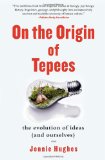Summary | Excerpt | Reviews | Beyond the Book | Read-Alikes | Genres & Themes | Author Bio

Critics' Opinion:
Readers' Opinion:
First Published:
Aug 2011, 320 pages
Paperback:
Jun 2012, 320 pages
 Book Reviewed by:
Book Reviewed by:
Jennifer G Wilder
Buy This Book
This article relates to On the Origin of Tepees
According to the Oxford English Dictionary, a meme (pronounced meem) is, "n. An element of a culture that may be considered to be passed on by non-genetic means, esp. imitation". A meme is a nugget of meaning, the smallest building block of an idea, the basic unit of culture. What a gene is to biology, some say, the meme is to anthropology. Just as an advanced organism, like an elephant, has a complex genetic code built up over millennia, so too does a cultural production such as Darwin's On the Origin of Species. In this case, an accretion of small ideas evolved over time and combined in new ways. In Jonnie Hughes's On the Origin of Tepees, memes are the building blocks of all human skill and knowledge. Like genes, they want to replicate. They want to be passed down, and it's the drive of memes that motivates cultural change.
The word "meme" was coined in Richard Dawkins's 1976 book, The Selfish Gene. He extracted it from the Greek word mimeme, "something imitated" (as in the English word "mimesis"). He made it short and catchy (on purpose) so it would sound like "gene." A meme, he wrote, is a cultural replicator in the way a gene is a biological one.
There is nothing settled about memes. Since the appearance of Dawkins's book, evolutionary scientists and linguists and psychologists, and even evolutionary psychologists (who, according to Hughes, are new since the 1990s) have wrangled the idea of the meme into different schemas. Is it ridiculous to imagine that the meme drives human choice in an effort to get itself passed down, as a gene does? Is creativity an illusion? And what about genius, and free will? Hughes's arguments raise many (controversial) questions. The thinkers that most influence his understanding of the meme are Daniel Dennett (author of Darwin's Dangerous Idea, 1995), R. Aunger (author of Darwinizing Culture: The Status of Memetics as a Science, 2000), and S. Blackmore (author of The Meme Machine, 1999).
But how do we isolate memes in order to study them? There is no deoxyribonucleic acid here. Hughes struggles with this himself - is the tepee itself a meme, or are the memes found in the smaller components, like the design of smoke flaps? The precise point at which a meme breaks down seems to be a fluid concept. The word tepee itself is a meme, and so is the ancient idea of building a shelter to live in instead of relying on trees and caves.
And of course the word meme has developed a life of its own on the internet. On the web, a meme is a viral cultural tchotchke - a funny YouTube video, a phrase like “honey badger”, a joke involving a picture of Ryan Gosling saying something that begins with “Hey girl.” So while every internet catchphrase and lolcat is, technically, one of the nuggets of cultural information that can be called a meme, not every meme leads to ROFL.

For more information on memes, click on the fascinating TED talk below in which Susan Blackmore discusses how ideas replicate themselves from brain to brain.
Filed under Cultural Curiosities
![]() This article relates to On the Origin of Tepees.
It first ran in the August 22, 2012
issue of BookBrowse Recommends.
This article relates to On the Origin of Tepees.
It first ran in the August 22, 2012
issue of BookBrowse Recommends.




Not doing more than the average is what keeps the average down.
Click Here to find out who said this, as well as discovering other famous literary quotes!
Your guide toexceptional books
BookBrowse seeks out and recommends the best in contemporary fiction and nonfiction—books that not only engage and entertain but also deepen our understanding of ourselves and the world around us.